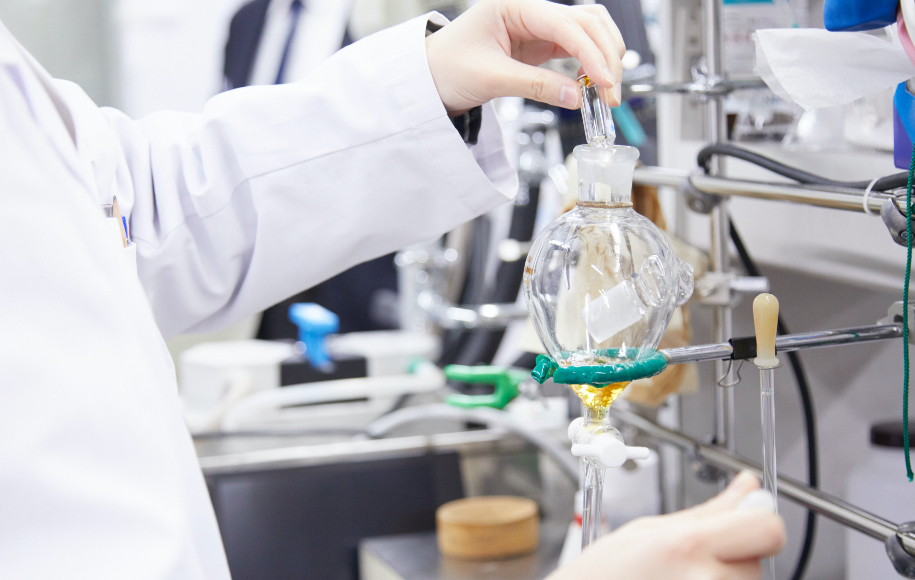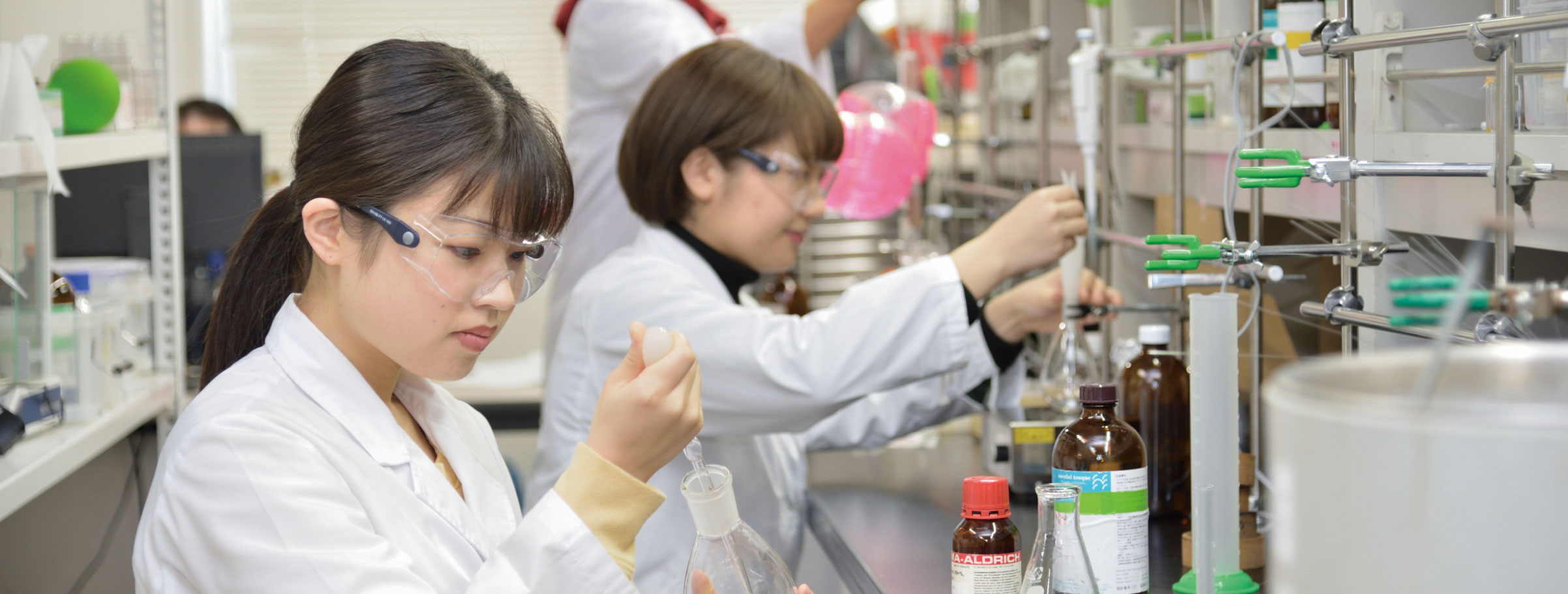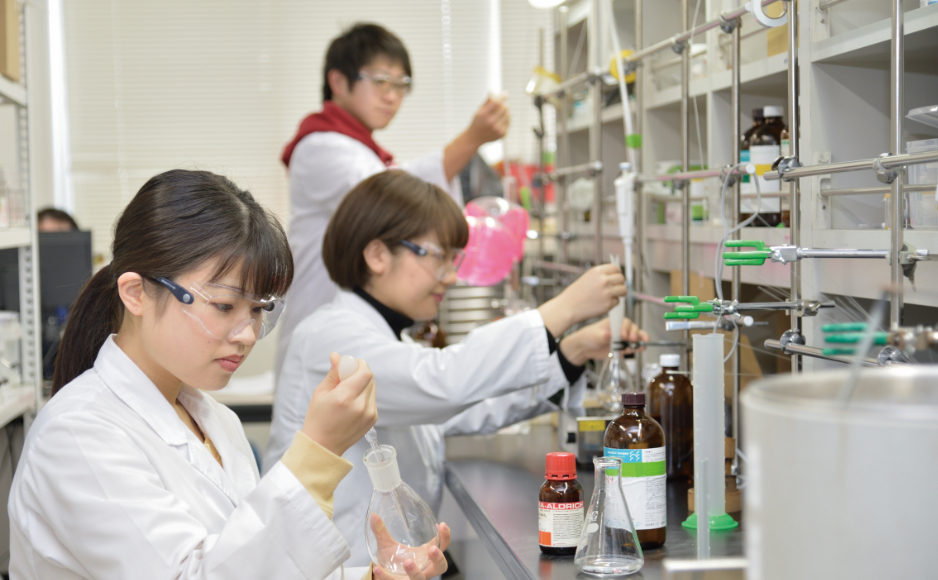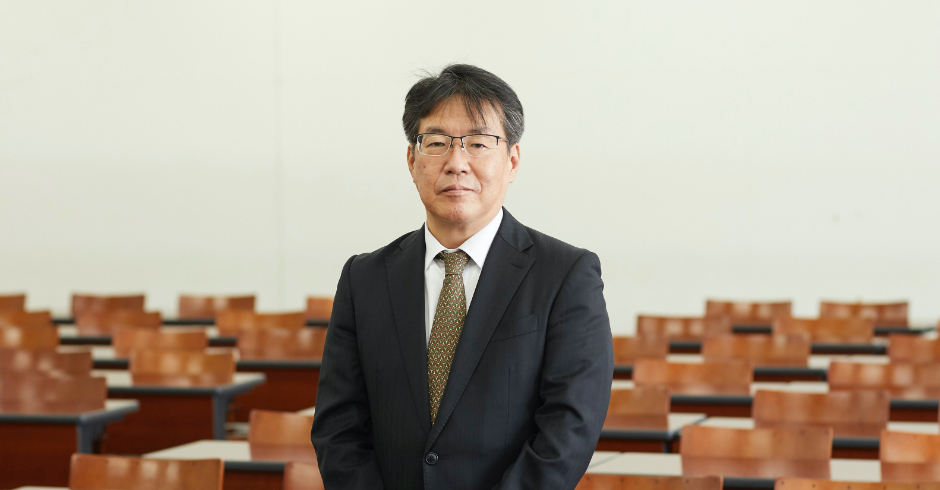

What are pharmaceutical sciences?
This department aims to train human resources who can work in education, research and development, and as technical experts in drug discovery, development, and production as well as other pharmacy-related fields including health foods, cosmetics, the environment, and public health. In addition to the study of the natural sciences similar to that offered by other science faculties, the curriculum also provides courses in subjects specific to pharmacy.

Aim to be a professional in drug manufacture, pharmaceuticals, food development, or cosmetics development!
While the main aim of the six-year courses in the different departments of pharmacy is to train pharmacists, the key goal of the four-year course in the Department of Pharmaceutical Sciences is to train researchers and technical experts. Many of our graduates go on to study at graduate school, and the department is characterized by a large number of students aiming for careers in R&D or technical positions. By taking specialist courses related to drug development and health maintenance and also conducting graduation thesis research with the goals of learning the latest techniques and cultivating problem-solving abilities, our students are able to acquire knowledge tailored to their own specific career aims. Research with a view to a particular career path is also possible, making this the ideal department for individuals who know they wish to do research.
Features of the Department of Pharmaceutical Sciences
Integrating pharmacy, medicine, and engineering

Study a broad variety of topics in the drug discovery research process
The Department of Pharmaceutical Sciences aims to teach and train technical experts (Meister) who can contribute to human health and happiness and work successfully in society in diverse fields, including drug discovery, clinical development, life-science related areas, food, and kampo medicine.
A wide range of classes also enable students to follow their desired career paths in areas other than pharmacy, including science, engineering, fundamental medical science, and agriculture.
Small-group teaching
Only 30 students are accepted per year
Our small class size of 30, the number of students accepted by the department each year, means that we can keep an eye on students individually in our teaching, and this is effective in extending the abilities of every student. Classes proactively incorporate initiatives such as active learning and small group discussions to help instill "sokuin no kokoro," or the ability to understand the suffering of others, in our students, improve learning effectiveness, and develop students' communications skills.
Internship system
Experience work in a pharmaceutical company, as a medical representative (MR), or as a registered sales clerk
Yokohama University of Pharmacy has established a framework for several different types of internship, including in pharmaceutical companies, as MRs, or as registered sales clerks, and existing students are encouraged to use these internships to gain experience and a firmer idea of their place in the labor market in future. The department also strives to support students' individual career paths, including holding registered sales clerk training sessions and study groups in preparation for teacher employment examinations.
Research laboratories
Drug discovery, life science, and food science-related research laboratories
From their third year, students in the Department of Pharmaceutical Sciences are assigned to a research laboratory, where they acquire problem-solving skills and learn the latest techniques by conducting research for their graduation thesis. Our research laboratories frequently publish their results as research papers. Some studies have also led to the development of commercial products, and students can enjoy carrying out research in their own area of interest.
Diverse career paths
100% employment rate, or progression to graduate school
The first student cohort graduated from the Department of Pharmaceutical Sciences in 2018. All of them found employment, and they are now thriving in various fields, including pharmaceutical manufacturing companies, as medical representatives or registered sales clerks, as public officials or science teachers, or in graduate school.
Graduate school entry
Yokohama University of Pharmacy Graduate School, Tokyo Medical and Dental University Graduate School, Tokyo Medical University Graduate School, University of Shizuoka Graduate School, Yokohama National University Graduate School
Teacher training
Support for qualification as a licensed science teacher
The Department of Pharmaceutical Sciences offers a teacher training course leading to the acquisition of a junior high school type 1 or senior high school type 1 science teacher's license. The department has also set up a Teacher Training Center that offers a wide range of support and advice for students taking this course, including subject guidance, advice on courses and practical training, and how to obtain a teaching license. The first student cohort, which graduated in 2018, has already led to the first high school science teachers from Yokohama University of Pharmacy.
Future potential

Succeed in diverse fields in future!
Succeed in diverse fields in future!
Graduation from the Department of Pharmaceutical Sciences can lead to success in diverse fields, including pharmaceuticals (manufacturing and sales), foods, and education. Students who want to acquire even higher-level knowledge and skills in future by becoming researchers or technical experts may go on to graduate school.
Drug discovery researchers and technical experts
These professionals are involved in drug discovery in pharmaceutical and healthcare-related companies. Researchers identify, synthesize, and screen new compounds that could lead to the development of new drugs. They investigate the mechanisms that cause diseases such as allergies, dementia, lifestyle-related diseases, and infections, and search for the "seeds" of new drugs that may be effective for treatment.
Pharmaceutical developers
These professionals are concerned with the development and safety of new drugs. As professionals in clinical and nonclinical trials for pharmaceutical development by pharmaceutical companies, their job is to provide effective, safe drugs.
Registered sales clerks and medical representatives
These professionals provide pharmaceutical information to doctors, pharmacists, and patients. Registered sales clerks are drug specialists who are one step down from pharmacists, specializing in the sale of general over-the-counter medications. Medical representatives (MRs) give information on the effectiveness and side effects of pharmaceuticals to doctors and pharmacists, and also gather such information from them.
Food development technologists
These professionals contribute to the development of the food industry of the future. Working in food companies and the like, they develop new foodstuffs, or manufacture and manage foods. Food researchers carry out research on new ingredients and foods in food company research laboratories, or in universities or research institutes.
Science teachers
Science teachers make science interesting and fun. In recent years, increasing expectations have come to be placed on the work of teachers who have received a proper education in pharmacy. Graduating from the Department of Pharmaceutical Sciences allows students who have acquired in-depth knowledge about health and drugs to become teachers who can instruct students on how to deal correctly with pharmaceuticals and health foods.
Public officials
Our graduates are also working as chemical scientists in local government bodies, where they contribute to health and environmental conservation from a public standpoint, as officials of national or local public bodies. If they are employees of a prefectural or municipal government, they are assigned to public health agencies (such as public health centers) or environmental agencies (such as departments concerned with the environment).
